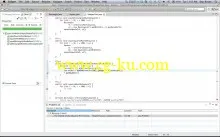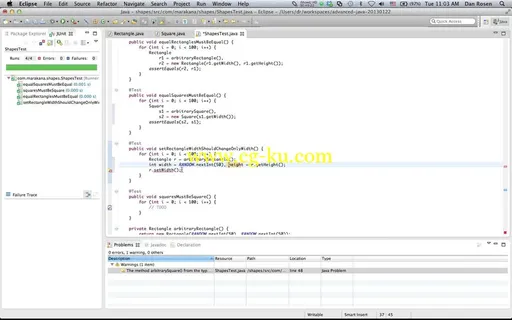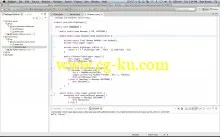
Marakana - Java Fundamentals and Advanced
WEB-Rip | MOV | AVC1 @ 500 Kbit/s | 1440x900 | AAC Stereo @ 128 Kbit/s 44 KHz | 40 Hours | 4.15 GB
Genre: Development / Programming, Java | Language: English
Advanced Java:
Advanced Java™ Training course provides you with advanced skills for programming in Java language.
This course delves deeper into the data structures, file input and output features, exception handing, object oriented design and analysis, object serialization, database connectivity with JDBC, multi-threaded programming, and networking capabilities of Java.
Upon completion, you will be able to understand, design, and develop complex Java-based applications.
Objectives
Upon successful completion of Advanced Java™ Training course, you will be able to:
Use reflection to examine objects at runtime and properly compare objects for equality.
Handle errors in your program by writing exception handlers.
Create and manipulate arrays and collections.
Read and write files using the java.io package.
Serialize objects using object serialization.
Write multi-threaded programs and synchronize threads.
Access data from relational databases using JDBC. Perform basic network communication using sockets.
Audience
You should take Advanced Java™ Training course if you are interested in learning more about the Java programming language in order to learn advanced programming techniques and concepts.
Prerequisites
To succeed fully in Advanced Java™ Training, you should be familiar and comfortable with basic Java programming concepts: Java syntax and object-oriented programming (OOP) in Java. These topics are covered in our Fundamentals of Java™ Training course.
Examination Concepts
Determining an Object's Type
Using the instanceof Operator
Using the Class.getName() Method
Reflection
Comparing Objects for Equality
Converting Objects to strings and integers (hash codes)
Sorting Objects
Exception Handling
Overview of Exceptions
Following the Control Flow of an Exception Handler
Writing Exception Handlers
Checked vs. unchecked exceptions vs. errors
Defining custom exceptions
Nesting exceptions
Data Structures
Creating and manipulating Arrays
Collections
Choosing a Collection
Working with Collections
Manipulating Lists, Sets, Maps
Understanding Java 5 Generics in Collections
I/O
Overview of the java.io Package
Working with the File Class
Identifying Input and Output Streams
Identifying Readers and Writers
Reading Data from a File
Writing Data to a File
Reading and Writing Objects
Serializing an Object
Multi-Threaded Programming
Overview of Threads
Observing a Computer's Processes
Observing a Multi-Threaded Program
Using Threads
Deciding Between Daemon and Non-Daemon Threads
Creating a Multi-Threaded Program
Thread Synchronization
The Producer/Consumer Problem
JDBC
Overview of SQL Language
Overview of JDBC and its drivers
JDBC API: connections, statements, result sets, metadata
Using JDBC: updates, queries
Basic Networking
Overview of Networking
Networking Concepts
Identifying Your Computer's IP Address
Using the InetAddress Class
Sockets
Implementing the Client Side of a Socket
Implementing the Server Side of a Socket
Developing a multi-threaded Server
Design Patterns
What are Design Patterns?
Singleton, Factory Method, Abstract Factory
Adapter, Composite, Decorator
Chain of Responsibility, Observer / Publish-Subscribe, Strategy, Template
Data Access Object (DAO)



发布日期: 2014-03-07